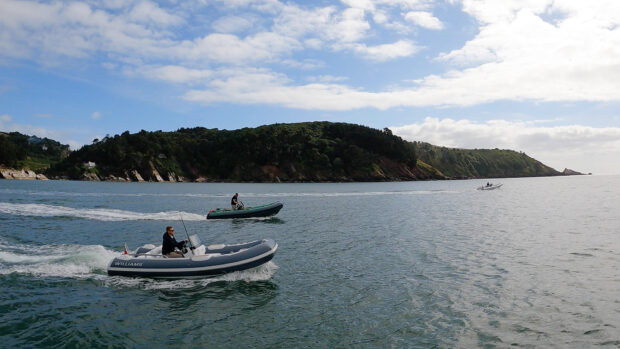Mr Ashley Mote, independent MEP for the South-East, has written to the Commission to support the derogation, but believes the EU removes our right to govern ourselves
Mr Ashley Mote, independent MEP for the South-East, has written to the Commission to support the derogation, but believes the EU removes our right to govern ourselves.
Mr Mote told MBM:
“I raised this issue with the commission some time ago. The answer is not particularly helpful, but it at least tells you where you stand.
“The only solution we have available to us is to leave the EU and restore the
right to govern ourselves.”
Mr Mote’s question and answer to the Commission reads as follows:
Does the Commission agree with the British Government’s view that the present derogation allowing UK boat owners to buy ‘red’ diesel, at a price with a discounted tax component, should continue after its scheduled abolition in January 2007?
If not, why not?
Does the Commission accept that diesel users in the UK already pay a higher percentage of tax than in any other part of the EU, and that the derogation is thus already aiding the creation of the ‘level playing field’ so lauded by the EU?
Does the Commission also accept that there is an avoidable safety risk involved? Higher tax on diesel will merely encourage the use of petrol engines which add to the danger of fire on board any boat.
Answer given by Mr Kovács
on behalf of the Commission
(3.11.2006)
The United Kingdom was granted a derogation from the general provisions of the Energy Tax Directive that allows it to apply, until the end of 2006, a reduced rate of excise duty to fuels used in navigation in private pleasure craft. The general rule provides that fuel used in private pleasure navigation is subject to excise duty.
In total, five out of 25 Member States were granted similar derogations. These derogations, together with more than one hundred other derogations, are due to expire under the Energy Tax Directive by the end of 2006. In June 2006, the Commission adopted a Communication containing an assessment of all the derogations, analyzing their compatibility with the general provisions of the Energy Tax Directive and with other Community policies (including the proper functioning of the internal market, fair competition and Community health, environment, energy and transport policies).
In this Communication, the Commission came to the conclusion that derogations for fuel used by private pleasure craft should end as they contradict several Community policies and the “polluter pays” principle. The Commission also stressed that derogations must aim at overcoming initial difficulties encountered with the implementation of a new legislation. Most Member States enjoying derogations have had sufficient time by now to adapt to the new situation given that fuel used by private boats has been taxable in principle since 1993 and that phasing-out of the derogation was initiated by the Commission in 2000.
As regards the particular points made, the Commission would like to stress that differences in actual excise duty rates between Member States are the inevitable consequence of the approach adopted by the Community in the field of excise duties. In the area of tax rates, Community legislation sets only the minimum levels of taxation above which Member States are free to set their own national rates at levels they consider most appropriate for their national circumstances. Should such a degree of harmonisation prove unsatisfactory, Community action, rather than an individual derogation, would be required, as stipulated in Article 93 of the EC Treaty.
Finally, the Commission would like to stress that taxation is not an instrument to deal with safety issues. Risks should normally be rigidly controlled by mandatory safety requirements, such as fire protection, fuel system installation etc.
Despite the arguments spelled out in the Communication and in line with its conclusions, the United Kingdom may apply for an extension of the derogation for specific policy considerations using the legal basis offered for such purposes in the Directive (Article 19), duly supporting such a request. The Commission will carefully examine the arguments presented and will take them into consideration while assessing the request in line with the procedure referred to in that Article.
This is a question and answer format that has been repeated many times by MEPs of all parties supporting the campaign, so the answer is fairly familiar to us. Although it reads quite firmly against the extension of the derogation, a decision has not been made, and many figures in Europe and in the UK Treasury believe that a concerted effort by UK politicians and constituents will yield a positive result.
If Mr Mote is your MEP, you can contact him at ashley.mote43@btconnect.com











